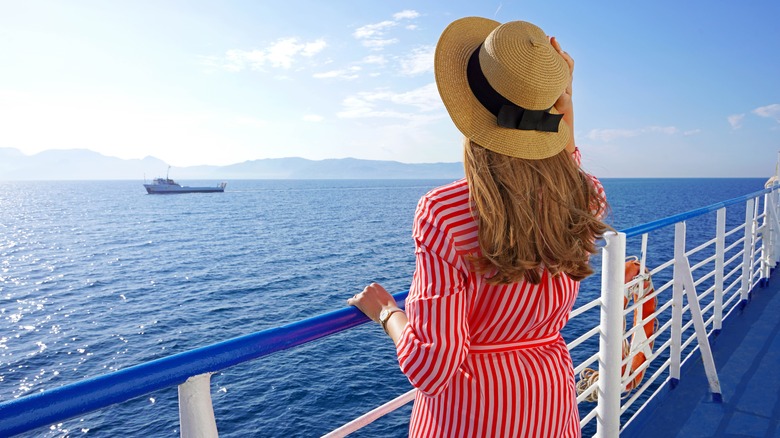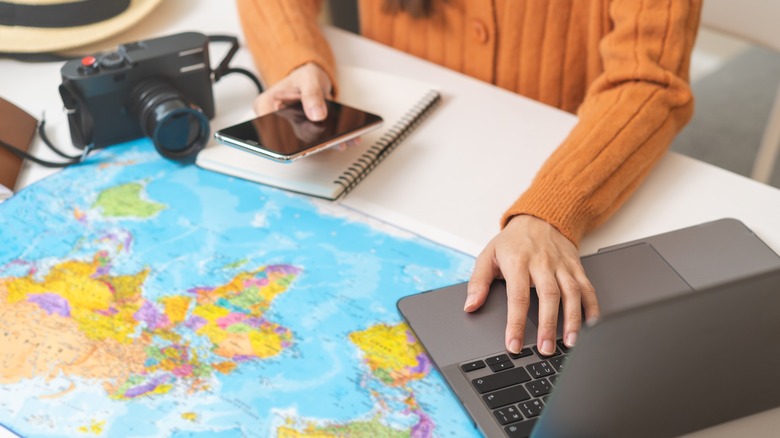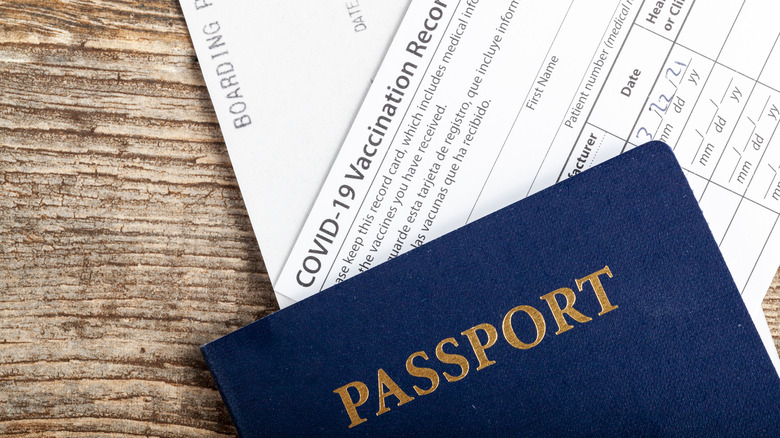5 Crucial Things You're Failing To Check Before Booking A Cruise
To say that cruising has been experiencing a resurgence in the post-pandemic era would be an understatement. More and more travelers are recognizing the ease and convenience cruises bring forth. Instead of bouncing from one transportation option to another, you can enjoy a peaceful journey from the comfort of a single vessel, disembarking only at designated ports. In 2024, Reuters reported that roughly 35.7 million travelers are projected to partake in cruises throughout the year, a notable bump from the 31.5 million in 2023. "Demand for 2024 has continued to accelerate with bookings consistently outpacing 2019 levels by a wide margin," Royal Caribbean Group's CEO Jason Liberty said.
However, as appealing as cruising may be, planning the perfect voyage requires more than a simple online booking. While reserving a spot on a cruise can be as straightforward as choosing a cruise line, selecting a cabin, and entering payment details on a travel website, there is a long list of things that still need to be taken into consideration for an unforgettable cruising experience. Unfortunately, many of these crucial aspects are often overlooked, especially by first-time cruisers.
To help ensure that you have a favorable cruise experience, here are five things you shouldn't ever overlook when booking a cruise. From perusing the cruise calendar to being aware of visa requirements, these factors are vital in making your trip on the seas a success.
Fare inclusions and the fine print
The beauty of cruising is that, more often than not, you're paying for an all-inclusive experience. The caveat? The term "all-inclusive" shouldn't be taken too literally. You're only setting yourself up for disappointment if you join a cruise on the assumption that you will not be whipping out your credit card on board. Before booking, take a moment to thoroughly understand what your fare includes and the additional costs that might arise during your journey. For example, while partaking in the buffet might be covered, specialty restaurants on the ship often require an extra fee. That said, being informed about what's included can help you better plan your budget.
It's equally crucial to check the cruise's fine print as well. After all, different cruise lines have different policies for cancelations and modifications, particularly for promotional fares. "Consumers feel if they cancel for a COVID-related reason, cancellation penalties will be waived," Anne Scrivinach, senior vice president of a travel agency, told The Points Guy. "This is not true; as reservations are secured, the penalties should be reviewed and understood." What's more, there are also restrictions on travelers. If you're traveling with your child alone, some lines require documented parental consent. If expecting, cruise lines can ask for a doctor's clearance. Reading the fine print can be a chore, sure, but it's vital to take the time to comb through policies instead of facing unexpected changes or penalties after you've committed to the cruise.
The cruise calendar
If you want a peaceful cruise experience and wish to avoid throngs of tourists when you arrive at a certain port, a cruise calendar comes in handy. Websites like CruiseTimeTables, CruiseDig, and Avoid Crowds have built-in calendars and tools that let you peek into the future of nearly any port. They can list the cruise ships scheduled to dock on specific dates, allowing you to gauge the number of fellow travelers by checking the passenger capacity of the ships. If you find that a port is set to be bustling with thousands of visitors when you plan to be there, you can save yourself the hassle and recalibrate your plans to find a less chaotic time to visit.
Then again, just because multiple cruise ships end up arriving in the same port at the same time as you doesn't necessarily mean that you should book a different cruise entirely. Carolyn Spencer Brown, chief content officer of Cruise Media, told Frommer's that you should only take caution if they are massive ships, those that usually come from famous cruise lines. "The smaller ships, those with under 500 passengers, aren't going to impact your trip," she explained. "That's true even if there are several ships in port at once. Overcrowding mostly occurs in the marquee ports where the bigger ships go, those that carry several thousand passengers."
The final payment dates
Just like how you pay close attention to the due dates of your credit cards, it's also crucial you keep tabs on the final payment date of your cruise. According to Marni Becker, the senior director for cruise partnerships at a travel agency, a common mistake that travelers make is presuming that cruise lines will show leniency if they miss the final payment date. "People are not paying attention to final payment dates or are assuming there is more flexibility with penalties than there really is," she told USA Today.
However, it's critical to understand that final payment dates are the make-or-break deadlines for cruises. Think of them as the deadliest deadlines of cruises, at least in terms of collecting payments. These deadlines are typically set 90 days prior to setting sail, so missing them often leads to significant consequences. In other words, not only could you lose your initial deposit, but may also miss the chance of joining the cruise altogether. Other times, you may even be asked to settle a penalty. The worst part is unlike other reminders you might receive, there are no warnings for this deadline (unless you have a travel agent, of course). Plus, when a cruise line does not receive your payment by the expected deadline, they might infer that you intend to cancel your booking. It's what's written on the fine print, after all.
Travel requirements and cruise line-specific provisions
Imagine the disappointment of being turned away at the cruise terminal due to missing essential travel documents. Some make the mistake of assuming that since you're technically aboard a ship nearly the whole time, passports or IDs will no longer be required. This, of course, couldn't be further from the truth. According to the U.S. Customs and Border Protection, proof of citizenship is still needed even if you decide to embark on a closed-loop cruise, which is one that departs and concludes in the same U.S. port and travels within the Western Hemisphere. If you don't have a passport, you may present an enhanced driver's license, a birth certificate, or a certificate of naturalization.
Beyond the basic travel documents, it's essential to stay updated with the cruise line's specific regulations. As noted by Cruzely.com founder Tanner Callais in an interview with USA Today, cruise lines may no longer expect passengers to have COVID-19 vaccines, but some may still necessitate proof of a negative test. "... it's the finer details around those protocols that may trip some people up, causing potential delays or denial of boarding," he said. Therefore, keeping yourself well-informed and prepared can mean the difference between smooth sailing and a frustrating experience.
Whether or not you're getting the best deal
Lastly, one thing you may neglect to check when booking a cruise is the possibility of saving even more money. Just like with scouting for flights, you'd be doing yourself a favor if you checked your options before committing.
Scott Campbell, manager of cruise relations at AAA, recommends timing your booking for the Wave Season, which spans January through March, as it's when cruise lines unveil their most enticing deals. "People have been hanging out with their family for Thanksgiving, for Christmas, talking about, 'Hey, we should do a cruise together, this would be awesome,'" he said of the season to USA Today. "So, come wave season ... that's when the cruise lines take advantage of all those holiday conversations and throw out a bunch of great deals." Alternatively, you can consult a travel agent, as they usually have affiliations with cruise lines and may have access to deals that are not available to the public. "They can help filter out the noise and get you in the right place," Campbell said.
But just like with all things travel, flexibility is your friend. You'd stand to save more if you're willing to adjust your travel plans. "The more flexible you are, the more likely you are to find a lower rate for your cruise," travel agency founder Rob Clabbers told Travel and Leisure, adding that sticking rigidly to your plans may only narrow your options and possibly increase costs.





